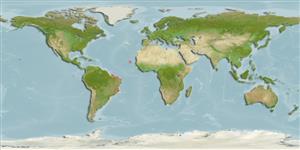>
Eupercaria/misc (Various families in series Eupercaria) >
Scaridae (Parrotfishes) > Sparisomatinae
Etymology: Sparisoma: Latin, sparus = a fish with a golden head + Greek, soma = body (Ref. 45335).
More on author: Steindachner.
Environment: milieu / climate zone / depth range / distribution range
Οικολογία
Θαλασσινό(ά) Υφαλόφιλο(α); εύρος βάθους 1 - 70 m (Ref. 40827). Tropical
Southwest Atlantic: endemic to Brazil and its oceanic islands.
Μέγεθος / Βάρος / Age
Maturity: Lm ? range ? - ? cm
Max length : 43.6 cm SL αρσενικό/απροσδιόριστο; (Ref. 111982)
Short description
Κλείδες προσδιορισμού | Μορφολογία | Μορφομετρία
TP individuals readily separated from S. rubripinne by the presence of a distinctive bright-yellow area on the pectoral -fin axil, blackish caudal fin margins, yellowish dorsal and anal fins, and general body color which is grayish-white in S. axillare and blue-green in S. rubripinne. Initial phase individuals of S. axillare are brownish-gray with a yellow stain on the flanks and different from S. rubripinne by the absence of a bright- yellow area on the caudal peduncle and caudal fin. Head profile more rounded S. axillare (Ref. 40827).
Maximum depth from Ref. 126840. Occurs in oceanic islands, dwelling in coral, algal and rocky reefs and on algal beds (Ref. 40827). An herbivore (Ref. 33499), cleaned by Elacatinus figaro observed off the coast of São Paulo, southeastern Brazil (Ref. 40102) and by Pomacanthus paru observed at the reefs of the Abrolhos Archipelago, off eastern Brazil (Ref. 40094).
Life cycle and mating behavior
Maturities | Αναπαραγωγή | Spawnings | Egg(s) | Fecundities | Προνύμφες
Moura, R.L., J.L. de Figueiredo and I. Sazima, 2001. A new parrotfish (Scaridae) from Brazil, and revalidation of Sparisoma amplum (Ranzani, 1842), Sparisoma frondosum (Agassiz, 1831), Sparisoma axillare (Steindachner, 1878) and Scarus trispinosus Valenciennes, 1840. Bull. Mar. Sci. 68(3):505-524. (Ref. 40827)
IUCN Red List Status (Ref. 130435)
Threat to humans
Harmless
Human uses
Εργαλεία
Special reports
Download XML
Διαδικτυακές πηγές
Estimates based on models
Preferred temperature (Ref.
123201): 23.6 - 27.6, mean 26.8 °C (based on 199 cells).
Phylogenetic diversity index (Ref.
82804): PD
50 = 0.5000 [Uniqueness, from 0.5 = low to 2.0 = high].
Bayesian length-weight: a=0.01288 (0.00813 - 0.02041), b=3.10 (2.97 - 3.23), in cm total length, based on LWR estimates for this species & Genus-body shape (Ref.
93245).
Τροφικό Επίπεδο (Ref.
69278): 2.0 ±0.1 se; based on size and trophs of closest relatives
Ελαστικότητα (Ref.
120179): Μεσαίο(α), ελάχιστος χρόνος για διπλασιασμό πληθυσμού 1,4 - 4,4 έτη (Preliminary K or Fecundity.).
Fishing Vulnerability (Ref.
59153): Moderate vulnerability (41 of 100).
Nutrients (Ref.
124155): Calcium = 44.3 [26.0, 82.7] mg/100g; Iron = 0.654 [0.359, 1.101] mg/100g; Protein = 18.3 [16.1, 20.7] %; Omega3 = 0.101 [0.060, 0.163] g/100g; Selenium = 33.3 [19.5, 61.8] μg/100g; VitaminA = 51 [16, 164] μg/100g; Zinc = 1.61 [1.12, 2.55] mg/100g (wet weight);
